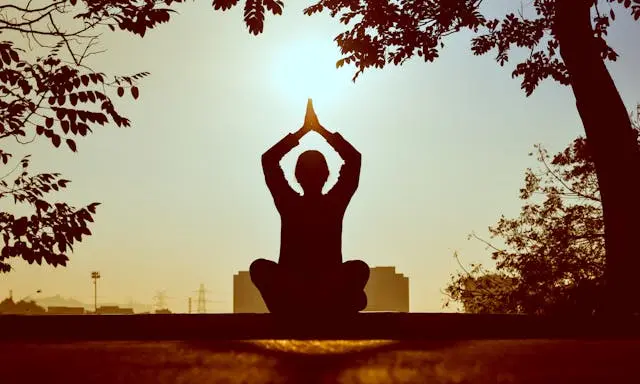Hey there! In today’s fast-paced world, many of us often feel overwhelmed by our busy schedules and constant demands. The good news is, there’s a simple, time-tested way to find some peace and calm amidst the chaos: mindfulness and meditation. These practices, rooted in ancient traditions, have gained popularity in recent years for their powerful benefits on both mental and physical health. Let’s dive deeper into how mindfulness and meditation can transform your everyday life.

What is Mindfulness and Meditation?
Before we explore the benefits, let’s clarify what mindfulness and meditation are all about.
Mindfulness is the practice of being fully present and engaged in the current moment, without distraction or judgment. It’s about observing your thoughts and feelings from a distance, without getting caught up in them. This practice encourages you to slow down and experience life as it unfolds, rather than worrying about the future or dwelling on the past.
Meditation, on the other hand, is a more structured practice that involves setting aside specific time to focus your mind and cultivate a state of relaxation and concentration. There are many forms of meditation, including:
- Breathing Meditation: Focusing on the breath to calm the mind.
- Body Scan: Paying attention to different parts of the body to release tension.
- Loving-Kindness Meditation: Cultivating feelings of compassion and love towards oneself and others.
- Guided Meditation: Following a guide or recording that leads you through a meditation session.
Both mindfulness and meditation aim to enhance awareness and bring a sense of tranquility and clarity to our lives.
The Benefits of Mindfulness and Meditation
- Reduces Stress and Anxiety
One of the most celebrated benefits of mindfulness and meditation is their ability to reduce stress and anxiety. Research has shown that these practices can significantly lower levels of cortisol, the stress hormone. By focusing on the present moment, you can break the cycle of worry and overthinking, which are common triggers for anxiety. Regular practice can help you develop a more relaxed and balanced outlook on life.
- Enhances Emotional Health
Mindfulness and meditation can boost your emotional well-being by promoting self-awareness and emotional regulation. These practices help you become more in tune with your emotions, allowing you to respond to situations with greater clarity and calmness. Studies have found that meditation can increase levels of serotonin and endorphins, the “feel-good” hormones, which can alleviate symptoms of depression and improve overall mood.
- Improves Focus and Concentration
In a world full of distractions, maintaining focus can be challenging. Mindfulness and meditation train your brain to concentrate better and stay focused on tasks. By regularly practicing these techniques, you can enhance your attention span and cognitive skills. This can be particularly beneficial in work and study environments, where improved concentration can lead to higher productivity and better performance.
- Promotes Better Sleep
Many people struggle with sleep issues due to stress and racing thoughts. Mindfulness and meditation can help you wind down and prepare your mind for a restful night’s sleep. Techniques like body scan meditation and deep breathing can relax your body and quiet your mind, making it easier to fall asleep and enjoy more restorative sleep.
- Boosts Physical Health
Mindfulness and meditation are not just beneficial for your mind; they also have positive effects on your physical health. Regular practice can lower blood pressure, reduce chronic pain, and improve immune function. The relaxation response triggered by meditation helps decrease inflammation and can even promote healing. Some studies suggest that meditation may also slow the aging process by reducing cellular stress.
- Fosters Better Relationships
Mindfulness helps you become more aware of your thoughts and behaviors, which can improve your interactions with others. By being fully present in your relationships, you can listen more attentively and respond more thoughtfully. This heightened awareness and empathy can lead to deeper and more meaningful connections with friends, family, and colleagues.
- Encourages a Positive Outlook
Practicing mindfulness and meditation regularly can shift your perspective towards a more positive outlook on life. By focusing on the present moment and cultivating gratitude, you can develop a more optimistic mindset. This can help you better appreciate the small joys in life and maintain resilience in the face of challenges.
How to Incorporate Mindfulness and Meditation into Your Daily Life
If you’re new to mindfulness and meditation, starting can feel a bit daunting. Here are some practical tips to help you get started and make these practices a part of your daily routine:
- Start Small: Begin with just a few minutes of mindfulness or meditation each day. As you become more comfortable, gradually increase the duration.
- Find a Quiet Space: Choose a peaceful spot where you won’t be interrupted. This could be a quiet room at home, a cozy corner, or even a park bench.
- Use Guided Meditations: If you’re not sure how to start, guided meditations can be incredibly helpful. There are numerous apps and online resources that offer guided sessions for beginners.
- Focus on Your Breath: One of the simplest ways to meditate is to focus on your breathing. Pay attention to the sensation of your breath as it flows in and out. If your mind wanders, gently bring your focus back to your breath.
- Practice Mindfulness in Daily Activities: You don’t always need to set aside time to practice mindfulness. Try to incorporate it into everyday activities like eating, walking, or even washing dishes. Pay attention to the sensations and experiences involved in these tasks.
- Be Patient and Kind to Yourself: Remember, mindfulness and meditation are skills that take time to develop. It’s normal for your mind to wander. When it does, gently bring your focus back without judgment.
- Join a Community: Sometimes, practicing with others can be motivating and supportive. Look for local meditation groups or online communities where you can share experiences and tips.
FAQs About Mindfulness and Meditation
Q: How long should I meditate each day?
A: If you’re just starting, even 5-10 minutes a day can make a difference. As you become more comfortable with the practice, you can gradually increase this time to 20-30 minutes or more.
Q: Do I need any special equipment to meditate?
A: No special equipment is needed. All you need is a quiet space where you can sit comfortably. Some people use meditation cushions or chairs, but a regular chair or a spot on the floor works just fine.
Q: Can mindfulness and meditation help with physical pain?
A: Yes, studies have shown that mindfulness and meditation can help reduce the perception of pain and improve coping strategies for managing chronic pain.
Q: What if I can’t sit still or my mind keeps wandering?
A: It’s normal for your mind to wander during meditation. When this happens, gently bring your focus back to your breath or the present moment. With regular practice, it will get easier to maintain focus.
Q: Can children practice mindfulness and meditation?
A: Absolutely! There are many resources and programs designed specifically for children. Teaching mindfulness to kids can help them develop better focus, emotional regulation, and stress management skills.
Q: Is it necessary to follow a specific type of meditation?
A: No, there are many different types of meditation, and it’s important to find what works best for you. Experiment with different techniques such as breathing exercises, guided meditations, or body scans to see what resonates with you.
Q: How soon will I see the benefits of mindfulness and meditation?
A: Some benefits, like reduced stress, can be felt almost immediately after a session. However, more profound changes in focus, emotional regulation, and physical health typically become noticeable with regular practice over a few weeks to months.
Conclusion
Incorporating mindfulness and meditation into your daily routine can have profound effects on your mental, emotional, and physical well-being. From reducing stress and enhancing emotional health to improving focus and fostering better relationships, these practices offer numerous benefits that can enrich your everyday life. So, why not give it a try? Take a few moments each day to pause, breathe, and be present. Your mind and body will thank you.
Remember, the journey to mindfulness is a personal one, and every step you take brings you closer to a more peaceful and fulfilling life. Happy meditating!
